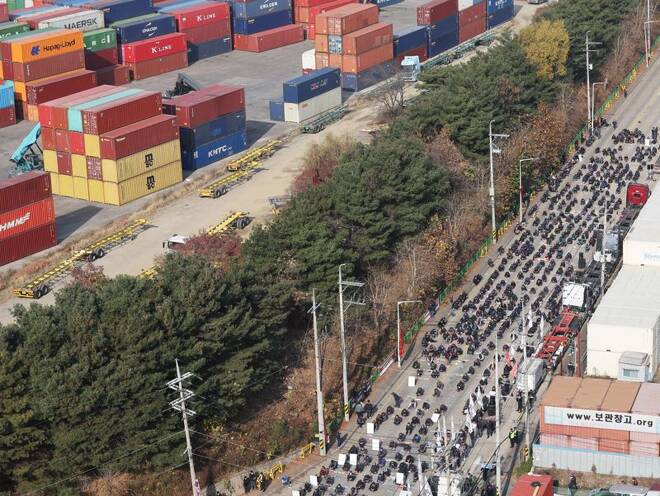Advertisement
Advertisement
Explainer-How South Korea’s trucker strike could paralyse critical supply chains
By:
SEOUL (Reuters) - The second mass strike by unionised truckers in South Korea in less than six months on Thursday has the potential to cripple supply chains in an export-driven economy which is the world's 10th-largest.
SEOUL (Reuters) – The second mass strike by unionised truckers in South Korea in less than six months on Thursday has the potential to cripple supply chains in an export-driven economy which is the world’s 10th-largest.
After an eight-day strike in June cost more than $1.2 billion in lost output and unmet deliveries, here’s how the latest dispute could affect various strands in the economy – and the disagreements that need to be resolved.
What are the sticking points?
Amid soaring fuel costs, truckers – many of whom are self-employed – are calling on the government to make permanent a minimum-pay system known as the ‘Safe Freight Rate’ that is due to expire by the end of the year, and to expand benefits for truckers in other industries, including oil tankers.
Truckers are also seeking representation in consultations to determine the freight rate.
However, a ruling party proposal for an amendment to the system eases punishment for businesses if they do not comply with the Safe Freight Rate compensation system.
The government has also said there is no justification in broadening out Safe Freight Rate coverage, claiming truckers already get paid fairly well.
How many truckers are on strike?
The transport ministry said about 9,600 people attended rallies on Thursday, while the Cargo Truckers Solidarity Union’s (CTSU) estimated members number 22,000. In contrast, some 420,000 truckers are estimated to be in South Korea, according to union officials.
Auto sector
Hyundai Motor said in a statement that logistics and vehicle production at its main Ulsan plant remain “unaffected at this stage”. But in June, production at Ulsan fell to below 60% of normal output because of component shortages caused by the strike, according to Hyundai Motor’s union in Ulsan.
The June strike cost the country’s automakers more than 5,400 vehicles in total output, the Korea Automobile Manufacturers Association said. The trade ministry estimated the June strike cost automakers more than 250 billion won ($188 million).
Steel
A Hyundai Steel spokesperson said on Thursday its daily shipment of about 8,000 tonnes of steel products at its Pohang factory could not be moved due to the strike. POSCO has warned that fresh action could slow repair work at a major plant hit by floods this summer.
During the June strike, five Korean steelmakers including POSCO and Hyundai Steel failed to ship 721,000 tonnes of products, according to the Korea Iron & Steel Association. The resulting output loss reached 1.15 trillion won, according to government estimates.
Cement
The cement industry is expected to be one of the earliest hit by the truckers’ strike, with cement company clients not having storage space for more than two or three days worth of inventory. An official at lobby group Korea Cement Association told Reuters construction sites might run out of building material by as early as next week.
During the eight-day June strike, the cement industry saw 106 billion won in lost revenue, according to the association.
Petrochemicals
Officials at three petrochemical companies told Reuters that they had yet to see any impact on operations as the strike has just begun, and had informed clients of the impending strike and shipped products in advance.
During the June strike, daily shipment of products at major petrochemical companies slid to around 10% of usual levels, according to the Korea Petrochemical Industry Association.
The industry ministry estimated that the strike cost the petrochemical sector about 500 billion won at the time.
What was the deal that ended the june strike?
During the June strike, transport ministry and truckers’ union agreed to “extend” the minimum freight rate and continue discussing expanding a guarantee of minimum pay for carrying cargo to cover additional products. The transport ministry said it would also review expanding fuel subsidies.
Despite the strike being brought to a close, there were lingering disagreements about whether the government and the ruling party had agreed to make the minimum freight rate a permanent feature, or merely extend a temporary measure for another fixed period. This discord ultimately ignited the current strike.
($1 = 1,327.8300 won)
(Reporting by Joyce Lee, Heekyong Yang and Ju-min Park; Editing by Kenneth Maxwell)
About the Author
Reuterscontributor
Reuters, the news and media division of Thomson Reuters, is the world’s largest international multimedia news provider reaching more than one billion people every day. Reuters provides trusted business, financial, national, and international news to professionals via Thomson Reuters desktops, the world's media organizations, and directly to consumers at Reuters.com and via Reuters TV. Learn more about Thomson Reuters products:
Advertisement
